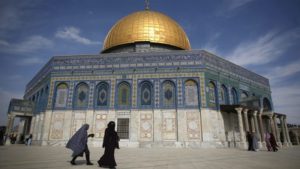 The United States has a track record of fighting its wars in the Middle East by generally recruiting local forces as proxies but then casting them off when regional politics intercede. Particularly evident in the Middle East, this pattern of abandoning allies is one of America’s least appealing characteristics. This failure to stick by those who take risks on its behalf in the region has led to mistrust in both the Middle East and in some other areas of the world. Currently, this syndrome is happening again in Kurdistan, as a Kurdish militia group known as the Peshmerge, proved to be the United States’ best ally against the Islamic State, only to be jettisoned in its time of need.On December 6th, US President Donald Trump recognized Jerusalem as the capital of Israel and initiated the process of moving America‘s embassy from Tel Aviv to the contested city. The move sparked global condemnation from world leaders especially Arab and European ones. After World War I and the collapse of the Ottoman Empire, Great Britain took control of Palestine including Israel, Palestine, and Jordan. In 1948, however, Israel’s independence gave the newly reconstituted nation East Jerusalem and Jordan the West portion, but at the end of the 1967 Six –Day War with Syria, Egypt and Jordan, Israel seized control of the entire city. America should have sanctioned Jerusalem as the capital at Israel’s independence rather than today.
The United States has a track record of fighting its wars in the Middle East by generally recruiting local forces as proxies but then casting them off when regional politics intercede. Particularly evident in the Middle East, this pattern of abandoning allies is one of America’s least appealing characteristics. This failure to stick by those who take risks on its behalf in the region has led to mistrust in both the Middle East and in some other areas of the world. Currently, this syndrome is happening again in Kurdistan, as a Kurdish militia group known as the Peshmerge, proved to be the United States’ best ally against the Islamic State, only to be jettisoned in its time of need.On December 6th, US President Donald Trump recognized Jerusalem as the capital of Israel and initiated the process of moving America‘s embassy from Tel Aviv to the contested city. The move sparked global condemnation from world leaders especially Arab and European ones. After World War I and the collapse of the Ottoman Empire, Great Britain took control of Palestine including Israel, Palestine, and Jordan. In 1948, however, Israel’s independence gave the newly reconstituted nation East Jerusalem and Jordan the West portion, but at the end of the 1967 Six –Day War with Syria, Egypt and Jordan, Israel seized control of the entire city. America should have sanctioned Jerusalem as the capital at Israel’s independence rather than today.
In spite of Trump’s decision, the international community does not recognize Israel’s jurisdiction and ownership of Jerusalem. The status of Jerusalem remains one of the main problems in efforts to resolve the Palestinian-Israel conflict particularly since Palestine anticipating making East Jerusalem its capital when it became a nation. Considered as one of the world’s holiest cities, Jerusalem remains hotly contested by the three Abrahamic religions. In my personally view, Jerusalem should be independent city and open to all three religions, Muslims, Christians and Jews
Legally and morally it may not even be in the best national interest to move the American embassy to Jerusalem, but both legally and morally it is in America’s best interest to move its embassy from Baghdad to Erbil to support the Kurdish referendum on October 16th for self rule, because the referendum for Kurds was to choose between freedom and subjugation. The Kurds have been fighting for freedom for their homeland for decades, but again the Kurds had to choose between death and subjugation. President Trump would correct this historical injustice of even today the Kurds not having a state of their own.
America and the international community, who despite being fully aware of the Kurds’ dream and aspiration, decided to turn a blind eye and even worse still to blame the Kurds who dare to dream of freedom. The United States joined the United Nations and an array of regional and world nations in taking Iraq’s side in the dispute and urged Kurdish Regional Government President Mastoid Bargain, who subsequently stepped down as the KRG leader, to scrap the September 25th unilateral referendum. US Secretary of State Rex Tillerson blasted the poll in which 92% of the nearly three million Kurds opted for independence, calling it illegitimate and said that the US would not recognize the independence referendum in Kurdistan but rather would continue “to support a united, federal, democratic and prosperous Iraq.” On the other hand, when it comes to the Palestinian or Israeli issue, Washington will talk about American values, pluralism, democracy, protection of human rights and minorities, but in the case of a free Kurdish nation neither President Trump nor the international community mentions those cherished core values instead seemingly cherishing and idealizing money.
Iraq is a failed state; it has failed to govern and failed to have fair governance for all. Iraq has failed because of severe insecurity, corruption, and foreign interference. Iraq failed when a terror organization took over one-third of the country. In February, it failed when the Prime Minister attempted to form a technocratic cabinet ignoring a balance of ethno-sectarian and partisan interests. It failed when Turkey staked out unapproved territory in the fight for Mosul for Ankara to oppose Kurdish forces (the PKK) and support allied militia. In addition, Iraq is no longer a sovereign state, because it is a puppet of Iranian Shia militant groups.
The rise of ISIS, however, clearly was a byproduct of a much bigger problem -- a political failure because Iraqis and Kurds cannot trust each other. In the face of this grave mistrust, the only way to win peace is to bring people together to prevent atrocities against Kurds through a realistic political settlement, one that recognizes Kurdistan as a sovereign nation. For President Trump it is a moral duty to right the historical unjust treatment of the Kurds by rectifying the mistake made under the Sykes-Picot Agreement that drew the lines on the map separating the Kurds into four different countries almost a century ago.
As part of a pattern of duplicity, the Kurds were betrayed in 1975, when the Shah of Iran with CIA assistance led their revolt against the Saddam regime; they were betrayed in the early months of 1991, following the end of the Gulf War, when Saddam used chemical weapons on the Kurds in March of 1988 at, among other places, Halabja. They are being betrayed again now. The US should stand firm with the Kurds as America’s natural ally. They were brave when the Iraqi army left their posts running away from ISIS. The Kurds continued to have boots on the ground in the war against ISIS, but now that ISIS has been defeated, millions of freedom hungry Kurds have a defeat that is another matter.
The Kurds of Iraq should be supported to hold a free democratic referendum, and the world should honor the results. For democracies, the latest episode of failure to recognize the Kurds’ long overdue independence represents a grave political mistake coupled with a moral failure that has no recent precedent. How can President Trump recognize Iran as his enemy and yet fail to see that an independent and stable Kurdistan would block the Shia imperial ambitions? Iran is a big problem in the region And Now ISIS has been replaced with Shiite groups who are outside government control and do not pay heed to state orders. This could only mean that another bloody and destructive war may sooner or later began again. This year Bagdad was besieged with challenges. The squaring off of former Sunni Prime Minister al-Maliki’s fight for status quo with Shite Moqtad al-Sadar’s desire for reform has threatened the stability of Prime Minister Haidar al-Abadi’s tottering political establishment. Given this year’s exacerbation of deep rifts in Iraq, its plunge into near chaos, and its vacant ministerial posts, the US should seize the high moral ground to back Erbil as the Kurdish capital of a newly constituted nation, a much more than symbolic sanction. I wish you all Happy New Year.
Dr. Aland Mizell is President of the MCI and a regular contributor to Mindanao Times. You may email the author at:aland_mizell2@hotmail.com
.

